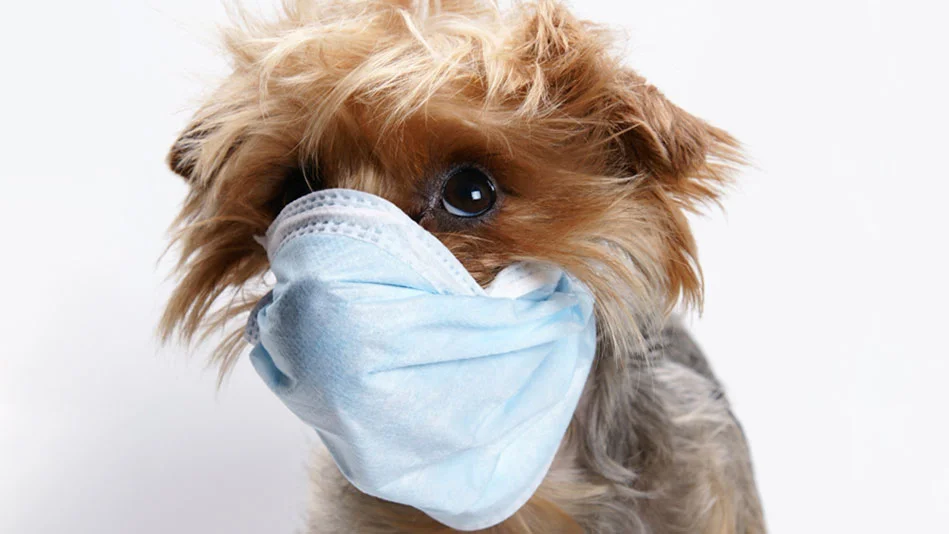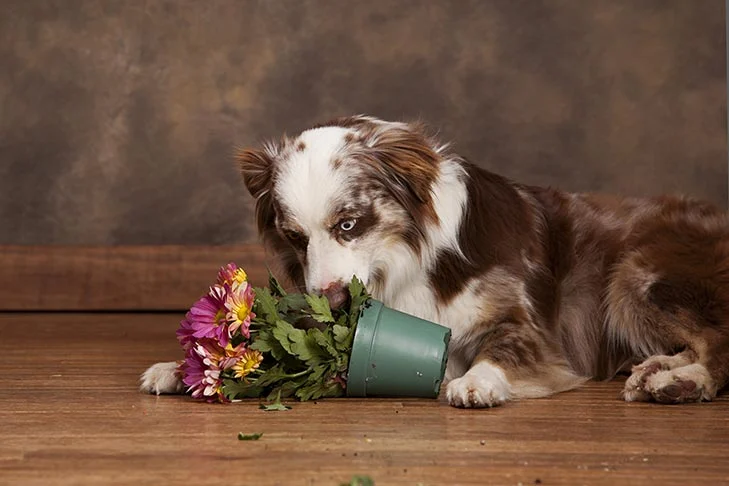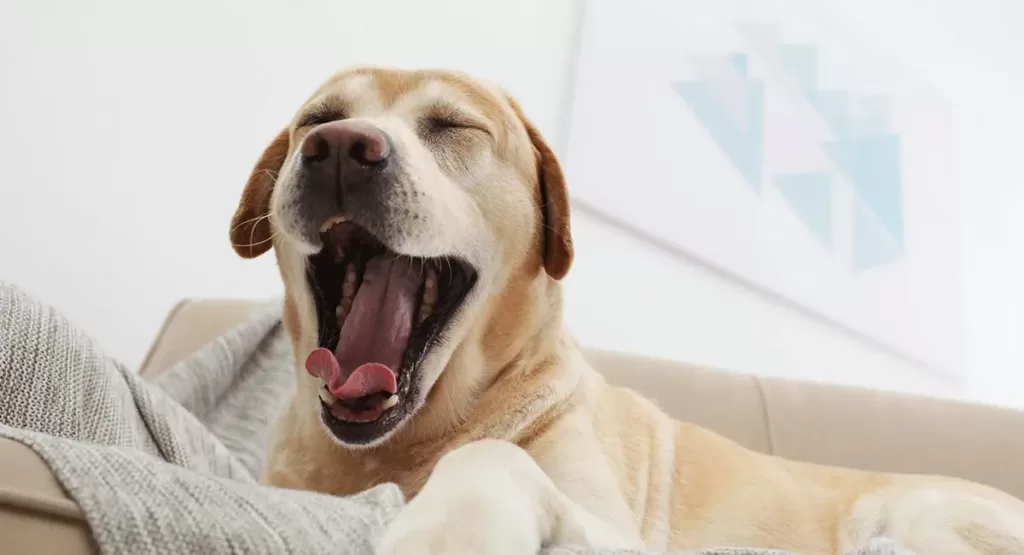As a new puppy parent, you might have noticed your puppy’s breath isn’t the sweetest. In fact, over 80% of dogs get some dental disease by 1 years old. This shows how important it is to tackle puppy bad breath early.
Table of Contents
Puppy bad breath is common but shouldn’t be ignored. Your puppy’s mouth health is key to their overall health. By learning about the causes, solutions, and ways to prevent bad breath, you can keep your puppy’s mouth fresh and healthy. are some steps that you can take to help him feel more comfortable and improve his oral health.
Key Takeaways
- Puppy bad breath is a common issue, with over 80% of dogs developing dental disease by age 3
- Understanding the difference between normal and problematic puppy breath is key
- Teething, diet, and dental hygiene can all contribute to bad breath in puppies
- Proper dental care routines, including teeth brushing and dental chews, can help prevent and manage puppy bad breath
- Seeking veterinary attention is important if bad breath persists or worsens
Understanding Normal vs. Problematic Puppy Breath
As a new puppy parent, it’s key to know the difference between normal and bad puppy breath. Fresh puppy breath smells mild and almost sweet. This shows they are healthy.
But, if their breath smells bad all the time, it might mean there’s a problem. You should pay attention to this.
What Fresh Puppy Breath Should Smell Like
Healthy puppy breath might smell a bit like milk or grass. But it should never be too strong or bad. This smell comes from their growing teeth and digestive system.
Keeping up with puppy teeth cleaning helps keep their breath fresh.
When to Be Concerned About Your Puppy’s Breath
If your puppy’s breath smells really bad, it could mean they have preventing puppy halitosis. Bad breath can show dental disease, digestive issues, or other health problems. You should watch for any changes in their breath.
If the bad smell doesn’t go away or gets worse, talk to your vet.
Age-Related Breath Changes in Puppies
Puppies’ breath changes as they grow and their teeth come in. Teething might cause some mild smells, but these should not be constant or bad. If your puppy’s breath smells bad all the time, it’s a sign of a bigger issue.
Common Causes of Puppy Bad Breath

As a responsible pet owner, it’s key to know why puppies have bad breath. Poor oral care and dental diseases are big reasons. Not brushing enough and not getting regular dental cleanings can cause plaque and tartar buildup. This can lead to gum inflammation and bad breath.
Health issues like digestive problems or metabolic disorders can also cause bad breath. What your puppy eats can affect their breath too. Keeping up with oral care and addressing health issues is important for fresh breath.
Also Read: 5 Best Dog Beds for Chewers and Aggressive chewers
Watching your puppy’s breath and fixing the causes can stop bigger dental problems. By focusing on oral hygiene for puppies, you help their health and happiness. A healthy mouth means a happy, healthy puppy.
The Link Between Teething and Breath Odor
When your puppy teething, you might notice their breath smells different. This is normal. Knowing when your puppy teething can help you deal with this issue.
Timeline of Puppy Teething
Puppies start teething at 3-4 months, when baby teeth fall out and adult teeth grow in. This can take until they are 6-7 months old. You might see more drooling, gum irritation, and a mouth odor during this time.
Managing Breath During Teething Phase
To keep your puppy’s breath fresh during teething, give them puppy dental treats and toys. These help clean their teeth and soothe their gums. Brushing their teeth with a soft toothbrush also cuts down on bacteria and bad smells.
Safe Teething Solutions
It’s key to give your puppy safe chew toys when they’re teething. This stops them from chewing on harmful things. Choose durable rubber or nylon toys made for teething puppies to ease their gum pain and satisfy their chewing urge.
Understanding teething and taking steps to manage your puppy’s breath can keep their mouth healthy. This ensures their breath stays fresh and clean.
Essential Dental Care Routines for Puppies

Keeping your puppy’s teeth clean is vital for their health. Start brushing their teeth early, around 8-12 weeks old. This helps avoid future dental problems.
Brush your puppy’s teeth every day, or at least 2-3 times a week. Use a soft toothbrush and toothpaste made for puppies. Make it fun by giving treats and praise.
Don’t forget to take your puppy to the vet for dental checks every 6-12 months. They can clean their teeth and spot any issues early. Dental chews and toys also help keep their teeth clean.
“Investing a few minutes each day in your puppy’s dental care can save you a lot of time and money down the road by preventing serious dental problems.”
Regular dental care keeps your puppy’s teeth and gums healthy. It’s all about prevention to keep their smile bright and breath fresh.
Natural Remedies and Safe Solutions for Puppy Bad Breath
Dealing with puppy bad breath can be a common challenge. But, there are many natural remedies and safe solutions to freshen your furry friend’s breath. We’ll look at home treatments, dental products, and dietary changes to keep your pup’s breath smelling clean.
Effective Home Treatments
One simple home remedy is to brush your puppy’s teeth with a soft-bristled toothbrush and pet-safe toothpaste. This removes plaque and food particles that cause odor. You can also wipe their gums with a damp cloth to keep them clean.
Recommended Dental Products
There are also puppy breath fresheners like dental chews, water additives, or dental wipes for puppies. These products help reduce bacteria and freshen breath without harsh chemicals.
Dietary Adjustments for Better Breath
What your puppy eats affects their breath quality. Try a high-quality, grain-free diet or add crunchy fruits and vegetables. This can improve digestion and reduce bacteria that cause bad breath.
“A balanced, nutritious diet is essential for maintaining your puppy’s overall health, including their dental wellbeing.”
By using these natural remedies for puppy bad breath, you can keep your puppy’s breath fresh. Always check with your vet if you have concerns about your puppy’s breath or dental health.
When to Seek Veterinary Care for Your Puppy’s Breath
As a responsible pet owner, watching your puppy’s dental health is crucial. Changes in their breath can signal a problem. While some odor is normal, especially during teething, bad breath that doesn’t go away may mean a serious issue. It’s important to know when to take your puppy to the vet for dental care.
If your puppy’s breath is always bad, and they have trouble eating, drool a lot, or show plaque or tartar, see a vet. These signs could mean dental infections, gum disease, or other health problems that need quick action.
“Maintaining good oral hygiene and addressing any dental problems early on can help prevent more serious complications down the line.”
Even if your puppy’s breath seems okay, regular dental check-ups with your vet are a must. These visits help your vet check your pup’s teeth, spot any problems, and give advice on keeping their mouth clean and breath fresh.
Being proactive and getting help when needed is vital for your puppy’s dental health. Early treatment of dental diseases is key to a happy, healthy, and fresh-smelling pup.
Conclusion
In this article, we looked at why puppies sometimes have bad breath. We talked about how to tell if their breath is normal or not. We also discussed how teething can affect their mouth health.
Keeping your puppy’s teeth clean is key to their happiness. Start a dental care routine early. Use natural and safe products to help. If you’re unsure, always ask your vet for advice.
Regular brushing, the right chew toys, and a balanced diet are important. They help keep your puppy’s breath fresh. This also stops bad breath from becoming a bigger problem.
By tackling puppy bad breath, you’re making your puppy’s life better. You’re also setting them up for a lifetime of good oral health. Caring for your puppy’s teeth and gums will make them happy and healthy.

